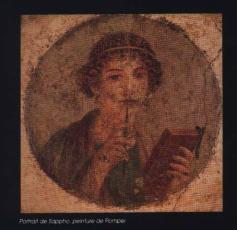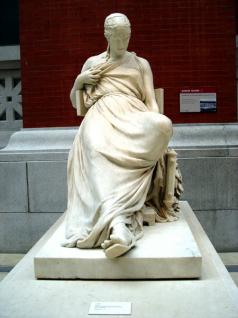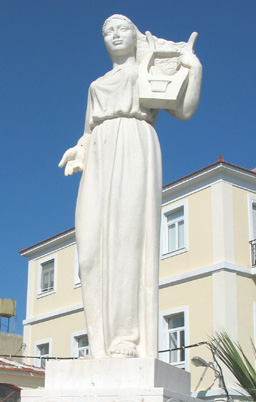 |
 Lesbian
Fiction Herstory Lesbian
Fiction Herstory |
![]()
From
Whence The Name Came
©
2005 by Lori L. Lake
Part 2 of 5
| "I
tell you, someone will remember us, even in another time." ~Sappho, Greek poet, teacher, and lesbian (c. 630 BCE) |
| Once upon a time, over 2,600 years ago, on an island called Lesbos, in the sunny Aegean Sea near Greece, there lived a woman of the Aristocratic class named Sappho (also sometimes spelled Psappha). She was beautiful and blessed by the gods and goddesses with the gifts of poetry, music, and teaching. Her poems were heralded, quite literally, near and far. Great poets, statesmen, and historians of antiquity lauded her name and praised her poetry. Sappho was the greatest and most acclaimed woman of ancient history. |  Sea View from Lesbos |
|
|
All of this is true. But if it
also sounds a little like a fairytale, it is. |
| Sappho
was a poetic genius. She came from the isle of Lesbos. In the custom
of her society, she apparently married and some say she had a daughter
named Cleis. She read and sang her poetry to enthusiastic crowds.
She was famous in her time . . . but of most interest to us, from
her legend and even from the shreds of poetry left behind, it is
clear Sappho loved women. In every way. She was called simply The Poetess, just as The Poet meant Homer, and later in history, The Bard referred to William Shakespeare. |
| Sappho worshipped and lauded Aphrodite, the goddess of love. Her poetry frequently mentions Aphrodite with admiration and appeals to her for intercession in Sappho's relationships with women. It is this aspect of her poetry that would later get her in trouble. More on that in a moment. For at least 700 years after her death, Sappho was honored throughout Greece and many parts of southern Europe. She had traveled a great deal in her life - how else to explain that residents of Syracuse put up a statue in her honor? Or that various regions honored her by minting coins bearing her image? Or that a huge statue of her was erected in the town square of Lesbos? They eradicated her words, but they couldn't erase the statues. |
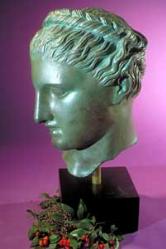 Sappho |
|
|
Sappho was a lyrical poet, well-known for the tone, meter, and grace of her poetry. This was music to the ears of listeners-literally. She was often accompanied by a lyre or harp, and her work included clever wordplay, allusions, metaphor, and humor. Single-handedly, she redefined the already-existing lyric meter of the day. Her work was so groundbreaking and marvelous that the Greek meter she often used was named after her and continues to bear that name to this day. Sappho created nine books of poetry, one of which was described as 330 stanzas of Sapphic meter. She wrote of passionate love of women and all that was feminine. She also wrote of the beauty of some of the men of the time and about the beauty of nature and the simple life, where love and sensuality were topics of real importance. She was so respected that Dracon of Stratonica, Alexander the Sophist, and Chamaeleon, a disciple of Aristotle, all wrote books about her and her work. She influenced the writing and thought of countless men, including Ovid, Catullus, Aristotle, Alcaeus, and Epicurus. The philosopher, Plato, called her the Tenth Muse. |
| But something happened along the way that subverted the proper telling of Sappho's life in the fairytale that is history. It is not clear when Sappho's star stopped shining, but as early as 140 A.D., men of the Christian church branded her a "whore" and described her work as deviant, especially due to her "unnatural" love of women. Some say her work was destroyed then, in the second century. Others say this occurred as late as the eleventh century. Either way, all that remains of the nine books of genius are fragments-actually forty pieces that make sense and only one poem in its entirety, and all are bits known only because they are contained within the work of later writers who quoted her. |
| By all accounts, Sappho's reading and singing of her poetry had the same emotional effect on her listeners as the music Beatles had on the Western world in the 1960s. What happened to her reputation and her poetry? Why are only fragments left when most of the works of Homer still exist in their entirety? |  Ruins on Lesbos |
| In another article I've written, The Emergence of the Lesbian Romantic Hero and the Plot She Thrives In: An Historical Backdrop, the constant refrain was: "You have nothing to read to affirm your lesbian existence." The calculated extinguishing of the work of Sappho appears to be nothing short of the attempt to blot out her very existence so that no woman would ever have any of Sappho's works to read. |
| For the last thousand years, it appears that many male scholars and historians have worked busily to revise the history of many aspects of the world, including Sappho's place of glory. Men tried to wipe away her record, but enough of her poems live on. Over the last 2,500 years, men have tried to claim that Sappho's lyrics were written by a man. Unbelievable amounts of scholarship and argument have been undertaken in attempts to prove that Sappho was not lesbian in her sexual orientation-or if she was, her love of women was never actually consummated. This went so far as a legend being promulgated that she swore off women and fell in love with a ferryman named Phaeon, and when he spurned her, she jumped off a cliff to her death. As if! History is selective. The old saying is "to the victor go the spoils," and it's clear that those in power write the history books. Sappho quite simply had to be written out. Her poems were subversive, they encouraged something other than a heterosexual and male-dominating model, and they placed a woman in a position of equality with - or perhaps even superiority to - Homer. |
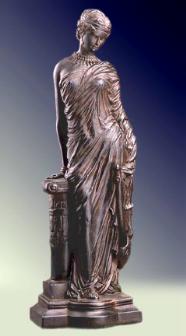 |
| |
And
yet . . . The myth of Sappho . . . the legend . . . shreds of her words . . . all live on. For 2600 years, women have clung to the belief that once upon a time, in a more open-minded and glorious age, women who loved women (and men who loved men, as well) were respected and honored and even managed to thrive. |
| But it wasn't
until the nineteenth century that women found ways to search for
and re-tell the story of Sappho. They dug beyond the fabricated
version of Sappho as a halfway decent heterosexual poet whose work
was lost, and they unearthed the truth-Sappho loved women in all
ways, and her work and life had been blotted out in order to preserve
male and heterosexual priorities. It wasn't until 1898 that some of the final fragments of Sappho's poems were found by the discovery of the Oxyrhynchus Papyri in Egypt, and this surely must have spurred modern speculation. As the nineteenth century drew to an end, interest in Sappho renewed and women studied and researched her life and poetry. Where there was little evidence or few facts, creative women wrote novels and stories that painted Sappho in positive - and lesbian - light. Natalie Clifford Barney and Renée Vivien had even traveled to Lesbos on a quest to learn more. Once again, the records aren't so easy to research, but women searching for and dreaming about the existence of Sappho must have made an impact on the current society of the late 1800s. How else to explain that the term Lesbian first appeared in printed English in the 1890 Billings Medical Dictionary? When the term first circulated in popular spoken lingo is anybody's guess. |
 Roman Aquaducts at Moria |
| English-speaking women will never fully know the wonders of Sappho's work, not only because so little of it was preserved, but also because the Sapphic meter is unique to the style, tone, and rhythm of the Greek language and does not translate to English. But the following translation of a section of a poem, which lauds Aphrodite the Goddess of Love and asks for intercession with Sappho's own love life, still packs power, even in English: |
|
|
Glittering-Minded
Deathless Aphrodite Glittering-Minded
deathless Aphrodite, |
| In her article "Sapphistries," feminist scholar Susan Gubar writes that Sappho represents "all the lost women of genius in literary history, especially all the lesbian artists whose work has been destroyed, sanitized or heterosexualized." Despite centuries of denial and exclusion and outright lies, we remember and we honor the memory of this unique and singular woman, The Poetess. |
| Modern View of Lesbos and the Aegean Sea |
| Lesbos, a little island in the Aegean Sea . . . an island of olive groves, wheat fields, wine cellars, and learning and love . . . a virtual Garden of Eden . . . This is from whence our name, Lesbian, is derived. Lesbians - women who love women - those who live the life that Sappho lived. One of Sappho's poem fragments is particularly prophetic: |
 Byzantine Castle on Lesbos |
| "And
I say to you, someone will remember us In time to come" |
|
|
Isn't
this the hope many people carry in their hearts-that their accomplishments
will not be lost and their lives will not have been lived in vain?
Women of power, of beauty, and of grace. Women who contribute to their families, communities, and the world. Women who should never be overlooked, whose voices should never be silenced, never be erased from the records of history. All lesbians, not just poets, should pay Sappho homage as a "first" in recorded history. The legend lives on. Let it live on in truth. |
| REFERENCE
BOOKS If you would like to read more about Sappho, her place in history, and her poetry, here are some excellent books: |
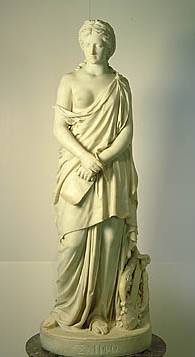
|
| Questions? Let me know by writing me at: Lori (at) LoriLLake (dot) com. Until next time! Lori |
|
|
| This page last updated on July 2, 2022 Go to other parts of the Lesbian Herstory Series: Part
1 Or Return to Lori L. Lake's Main Website All contents of this web site are protected
by U.S. and International copyright laws |
